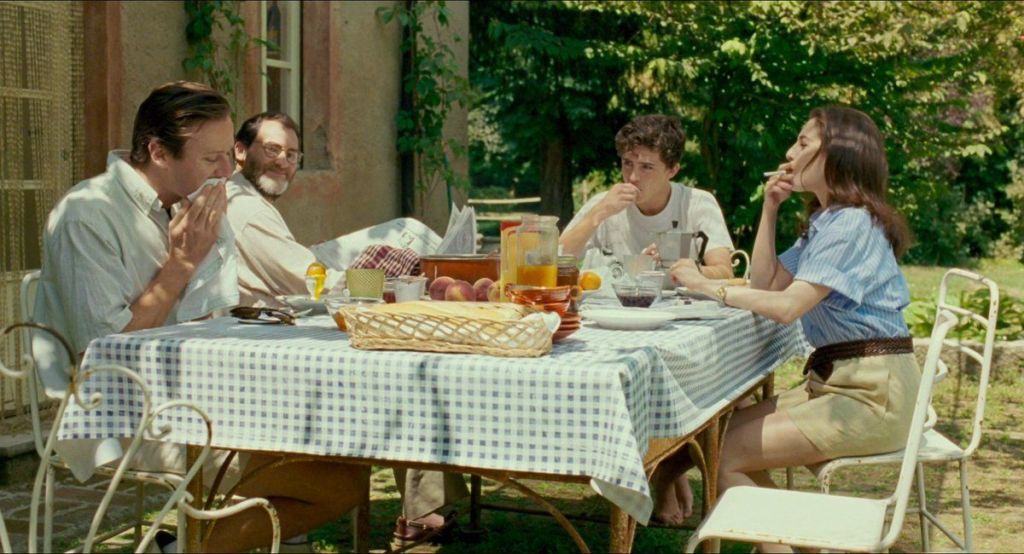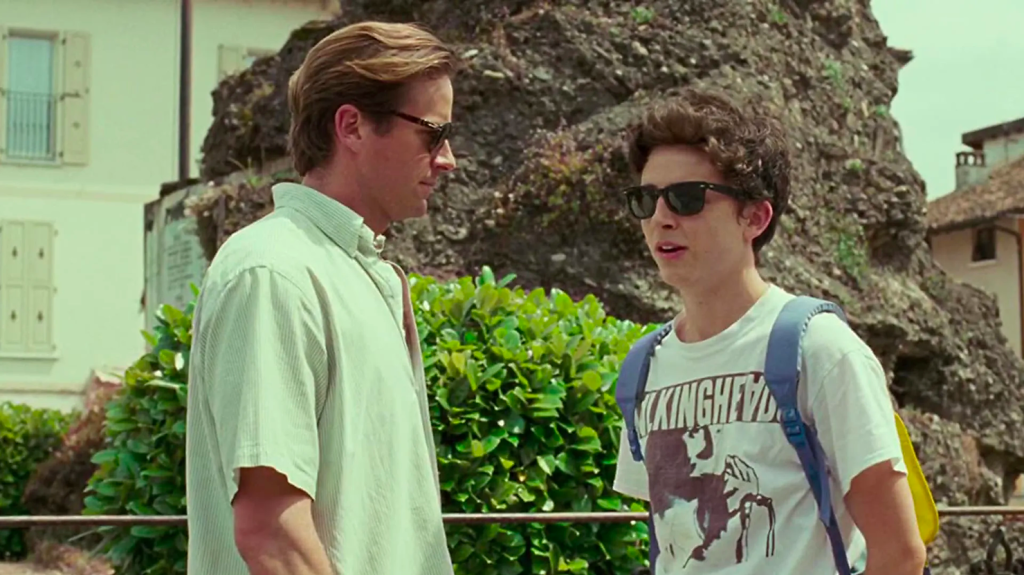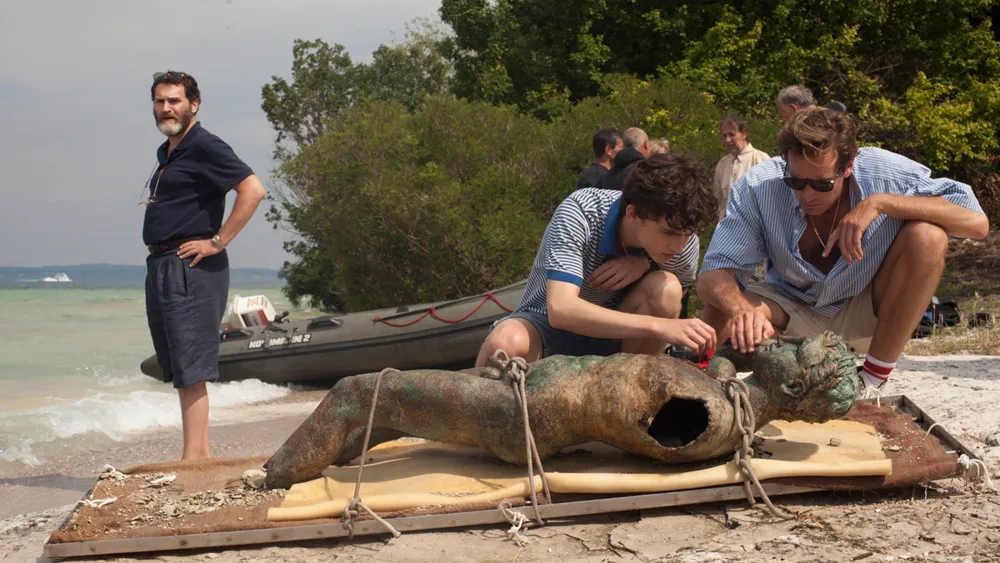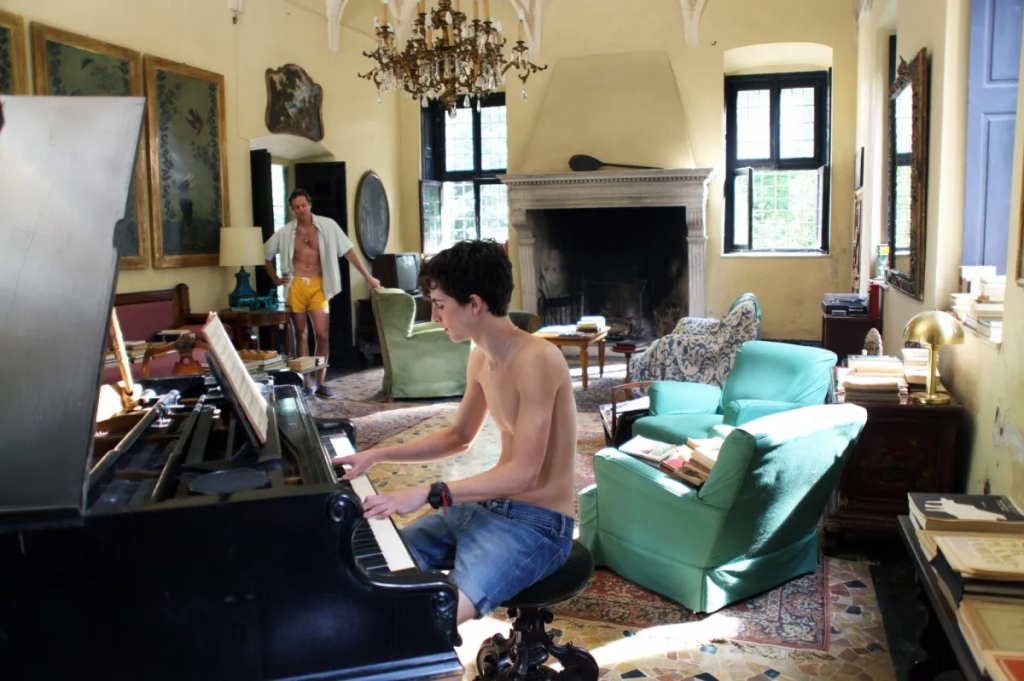
[English version below]
Difícil pensar en algo más glam que recibir una invitación para veranear en algún lugar del norte de Italia (‘somewhere in Northern Italy‘) en una villa del siglo XVI decorada con frescos de Aurelio Busso, alumno del mismísimo Rafael. No le pasa a mucha gente pero le pasó a Oliver, un estudiante de doctorado que gracias a su buena fortuna terminó invitado por el profesor Samuel Perlman a su villa en Lombardía para tomar el sol, comer bien y asistirlo en su trabajo académico durante seis semanas.
Todos están felices por la llegada de Oliver excepto Elio, el hijo adolescente del matrimonio Perlman. Elio se ve obligado a cederle su cuarto al invitado, que no sólo lo desplaza sino que también resulta ser un tipo medio confianzudo y pedante cuya presencia en la villa no se siente como una visita sino como una invasión. El usurpador, como lo llama incluso antes de conocerlo, tiene además la mala costumbre de despedirse soltando un later que suena super pretencioso y llega tarde cuando lo llaman a comer o directamente no aparece, lo que para Elio es inaceptable porque todo el mundo sabe que en casa ajena eso no se hace. Detestable. Lo bueno es que Elio no está solo ni desocupado. La música y la lectura son refugios seguros y tiene amigas con las que se da una que otra zambullida en la piscina de piedra de la villa y va a fiestas en el pueblo de vez en cuando. Marcia es la más especial. Es bellísima y últimamente se ha mostrado risueña y complaciente en las verbenas del verano y quizá esté dispuesta a algo más. Serán una semanas inolvidables para todos y Elio y Oliver no se imaginan hasta qué punto la sensualidad del sol italiano terminará por acercarlos.

Call me by your name es una película sobre momentos definitivos de crecimiento emocional. Elio explora con relativa libertad los límites de su sexualidad y con ello embarca al público en un relato sobre primeras veces: la primera impresión, el primer amor, el primer beso. La primera turbación genuina por la presencia del otro que se convierte en delicia y castigo al mismo tiempo. Y si bien es Elio quien está maravillado por las infinitas posibilidades de su cuerpo, los personajes que lo rodean, la villa señorial y hasta el paisaje mismo, todo invita al descubrimiento de los sentidos y al hedonismo. Sólo hay que ver la presencia constante de esculturas helenísticas y romanas de cuerpos perfectos en la película (‘they’re so sensual‘, dice Oliver), sugiriendo que hubo un tiempo anterior sin tabúes ni censura en donde las pulsiones eróticas de todo tipo eran aceptadas y hasta celebradas. Elio y Oliver, por tanto, no estarían haciendo nada distinto de responder de manera honesta a un llamado que los trasciende y los conecta con tendencias esenciales del ser humano. ‘We haven’t done anything to be ashamed of, and that’s a good thing‘, dice Oliver en algún momento.
La conversación de Elio con su padre hacia el final de la película es uno de los momentos más íntimos y memorables (el otro momento memorable sería la escena del melocotón, claro). El director, Luca Guadagnino, se las arregla para mostrar un intercambio sobrio y lleno de cariño paternal en donde el consejo oportuno no suena aleccionador o moralizante sino lleno de comprensión y afecto. El terreno común de Elio y su padre es el interés intelectual y desde ahí el Dr. Perlman no sólo comparte una parte de su alma con su hijo sino que ilumina para él nuevas posibilidades en las relaciones humanas, insistiendo en que no vale la pena vivir la vida desde el miedo: “We rip out so much of ourselves to be cured of things faster that we go bankrupt by the age of thirty.” No hay condescendencia en sus palabras sino más bien una invitación a ser valiente y defender las verdades personales incluso si eso implica el propio sufrimiento. Bellísimo. La escena final, ese primer plano del rostro de Elio mirando al fuego en pleno invierno, lo dice todo.
M. Dolores Collazos


[English version]
It’s difficult to think of something more glamorous than receiving an invitation to spend the summer ‘somewhere in Northern Italy’ in a 16th-century villa beautifully decorated with frescoes by Aurelio Busso, a student of Raphael. Not many people experience this, but it happened to Oliver, a PhD student who, thanks to his good fortune, was invited by Professor Samuel Perlman to his villa in Lombardy to sunbathe, eat delicious food, and assist him in his academic work for six weeks.
Everyone is excited about Oliver’s arrival, except for Elio, the teenage son of the Perelmans. Elio is forced to give up his room to the guest, who not only displaces him but also proves to be a little too familiar and arrogant. Oliver’s presence in the villa feels more like an invasion than a visit. Even before meeting him, Elio refers to him as ‘the usurper’. Oliver has the bad habit of saying goodbye with a pretentious ‘later’, which irks Elio. He is often late for meals or doesn’t show up at all, which is unacceptable behavior in Elio’s eyes, especially considering it’s someone else’s home. Simply detestable. The silver lining is that Elio isn’t alone or idle. Music and reading provide solace, and he has friends to accompany him for an occasional dip in the villa’s stone pool or to attend village parties. Marcia is particularly special. She is stunningly beautiful, and lately, she has been cheerful at the summer parties, maybe she wants to go further. These weeks will be unforgettable for everyone, and Elio and Oliver cannot anticipate how deeply the sensuality of the Italian sun will draw them together.
Call Me by Your Name is a film about defining moments of emotional growth. Elio’s relatively uninhibited exploration of his sexual boundaries engages the audience in a narrative about first experiences: the first impression, the first love, the first kiss. The first time one feels genuinely unsettled by someone else’s presence, which becomes both delightful and punishing. Although it’s Elio who is entranced by the limitless possibilities of his body, the surrounding characters, the villa, and even the landscape, everything serves as an invitation to discover the senses and ultimately indulge in hedonism. A notable example is the ubiquitous presence of Roman and Hellenistic sculptures of perfect bodies in the film (‘they’re so sensual,’ says Oliver), suggesting a time when there were fewer taboos and censorship, and erotic impulses of all kinds were not only accepted but celebrated. Elio and Oliver are simply responding honestly to a call that transcends and connects them to essential human desires. ‘We haven’t done anything to be ashamed of, and that’s a good thing,’ says Oliver at one point.
The conversation between Elio and his father towards the end of the film is one of the most intimate and memorable moments (besides the peach scene, of course). The director, Luca Guadagnino, manages to show an exchange of words sober and full of parental affection, where timely advice doesn’t appear as instructive or moralistic but is full of understanding and tenderness. The common ground between Elio and his father is their intellectual interest, and from there Dr. Perelman presents his son with new possibilities in human relationships, highlighting that a life lived in fear isn’t worth it: ‘We rip out so much of ourselves to be cured of things faster that we go bankrupt by the age of thirty.’ His words are not condescending, but they are an invitation to boldness and to defend personal truths even at the expense of one’s suffering. Beautiful. The final scene, that close-up of Elio’s face looking at the fire in the middle of winter, says everything.
M. Dolores Collazos